
-
Find the right food for your petTake this quiz to see which food may be the best for your furry friend.Find the right food for your petTake this quiz to see which food may be the best for your furry friend.Featured productsAdult Dog Food
Hill's Science Plan Adult Multipack Wet Dog Food with Chicken, Beef & Turkey are complete premium pet foods for adult dogs from 1 year. Your dog will love these deliciously smooth and savoury minced loaves, formulated for balanced nutrition and overall health.
Shop Nowwith Chicken, with BeefHill's Science Plan Puppy Multipack Wet Dog Food with Chicken & Beef are complete premium pet foods for growing puppies from weaning until 1 year old and for pregnant and nursing dogs. Your puppy will love these deliciously smooth and savoury minced loaves, formulated for balanced nutrition and overall health.
Shop Nowwith Chicken, with BeefHill's Science Plan Mature Adult Multipack Wet Dog Food with Chicken & Beef are complete premium pet foods for mature adult dogs from 7 years. Your dog will love these deliciously smooth and savoury minced loaves, formulated to deliver the appropriate amount of energy to support the needs of adult dogs.
Shop NowFeatured products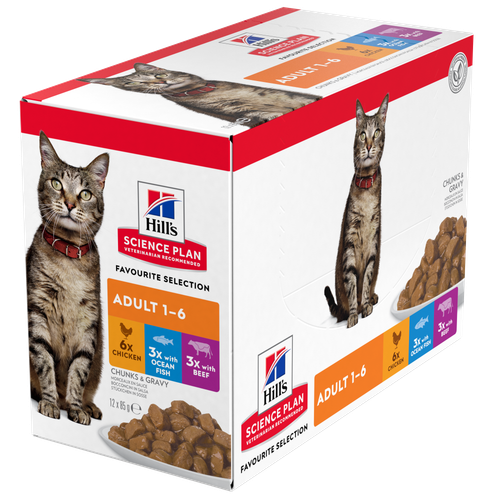 Adult Wet Cat Food with Chicken
Adult Wet Cat Food with ChickenTender chunks in gravy for cats, with high-quality protein to maintain lean muscle. With vitamin E and omega-3s & -6s for healthy skin and balanced minerals to support healthy vital organs.
Shop Now with Ocean Fish, Chicken
with Ocean Fish, ChickenTender chicken chunks in gravy for cats, with L-carnitine and fewer calories for ideal weight management. Packed with high-quality protein, omega-6s, and vitamin E for shiny fur and healthy skin.
Shop Now Mature Adult Wet Cat Food with Chicken
Mature Adult Wet Cat Food with Chicken
Tender chicken chunks in gravy for mature adult cats. Made with easy-to-digest ingredients, high-quality protein for lean muscle maintenance and antioxidant vitamins C+E for optimal health.
Shop Now -
Dog
- Dog Tips & Articles
-
Health Category
- Weight
- Food & Environmental Sensitivities
- Urinary
- Digestive
- Joint
- Kidney
-
Life Stage
- Puppy Nutrition
- Adult Nutrition
- Senior Nutrition
Cat- Cat Tips & Articles
-
Health Category
- Weight
- Skin & Food Sensitivities
- Urinary
- Digestive
- Kidney
-
Life Stage
- Kitten Nutrition
- Adult Nutrition
Featured articles Show some love with wet foods: a great choice for pets with health issues
Show some love with wet foods: a great choice for pets with health issuesShow some love with wet foods: a great choice for pets with health issues.
Read More The Right Diet For Your Pet
The Right Diet For Your PetIn people, the right diet is very important. If you are eating the wrong way for your metabolism, activity level, age and lifestyle you could end up with health issues.
Read More The Incredible Science Behind Your Pet's Microbiome
The Incredible Science Behind Your Pet's MicrobiomeLearn what your pet's microbiome is, how it contributes to your pet's gut and overall health, and why nutrition is important in maintaining healthy microbiomes.
Read More -


Help, my cat has an Upset Stomach!
Have you noticed your cat has bloody poop or keeps being sick? Lots of cats suffer from upset tummies from time to time. While the specific details sometimes don’t make pleasant reading, it’s important that you know what to expect and how to act. Vomiting and diarrhoea are no fun for our pets or us as owners but occasional episodes of sickness or runny, watery poop are part and parcel of life with our pets.
Check Out the Signs
If you hear your cat making sounds as if it is about to be sick, act quickly to place some newspaper or an old bowl or tray in front of them. This way you avoid moving them if they are uncomfortable but keep the mess to a minimum. Similarly a cat scratching at the door to be let out may be suffering from loose motions and may not have the same control over their bowels that they normally do. Some cats can seem restless, if they have pain in their abdomen, or they may just curl up and look miserable. Other signs to be on the lookout for include weight loss, changes in appetite, flatulence, a gurgling stomach or straining while passing a motion.
What’s the Trigger?
Most of the time stomach upsets are caused by cats eating something that they have a reaction to, such as a bird or a mouse they've caught, bolting their food or hairballs. With a little help, most cats get over these kinds of upsets relatively quickly, so do ask your vet for advice at an early stage. Some pets though have more long lasting disorders that never seem to fully resolve, or that flare up at various times. A vet will usually need to perform various tests to establish the cause of tummy troubles that are more long lasting. Keep a diary of when the cat has problems, the signs they show and what they ate in the days leading up to an episode to help establish a diagnosis.


Tasty Tips
Top Tips
- If your cat is vomiting, remove immediate access to food and make sure fresh water is readily available.
- If the cat seems unwell, continues to vomit or has blood in the vomit or diarrhoea, contact your vet.
- Ask your vet about when you can start to offer small amounts of highly digestible cat food. Therapeutic cat food, available from veterinary practices, is often recommended for pets after a stomach upset.
- Continue feeding the recommended pet food for around 5 days, or as directed by your vet.
- After this time slowly add in some of your cat’s normal food, gradually increase the amount and reduce the amount of the therapeutic food over the next 7 days, until your cat is being fed normally.
Always seek the advice of your vet if you are concerned about the health of your pet.
Reviewed by Dr. Hein Meyer, DVM, PhD, Dipl-ECVIM-CA and Dr. Emma Milne BVSc FRCVS


One of our staff authors prepared this article for you
Related products

Tender chicken chunks in gravy for mature adult cats. Made with easy-to-digest ingredients, high-quality protein for lean muscle maintenance and antioxidant vitamins C+E for optimal health.

Tender chunks in gravy for cats, with high-quality protein to maintain lean muscle. With vitamin E and omega-3s & -6s for healthy skin and balanced minerals to support healthy vital organs.

Tender chicken chunks in gravy for cats, with L-carnitine and fewer calories for ideal weight management. Packed with high-quality protein, omega-6s, and vitamin E for shiny fur and healthy skin.
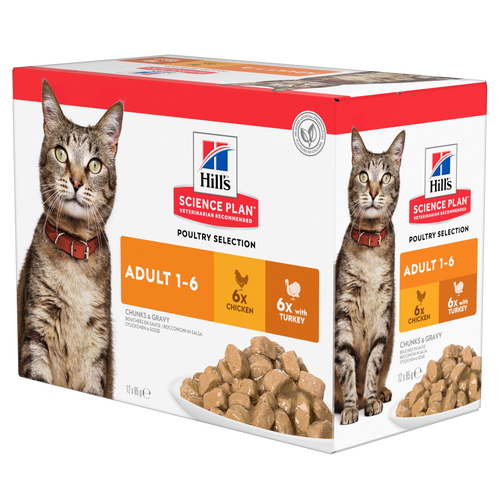
Hill's Science Plan Adult Cat Premium Chunks in Sauce with Turkey is a complete pet food for adult cats aged 1-6 years
Related articles
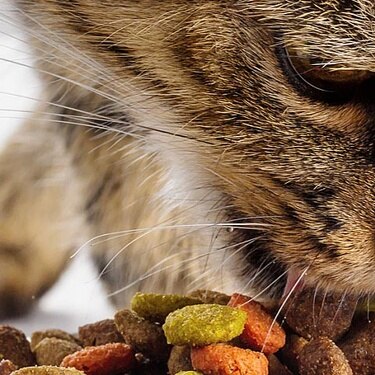
From essential vitamins & minerals to different types of meat, learn what to look for when choosing the best cat food for your feline.

There are three common ways to feed a cat. Each way has its advantages and disadvantages.
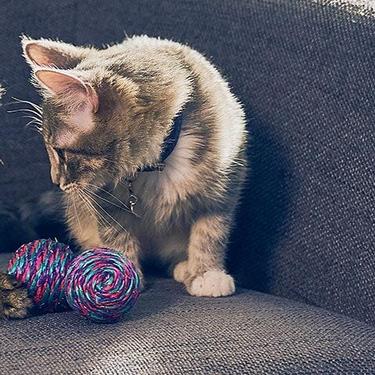
Kittens grow a lot in their first year, so it is important to provide them with the proper nutrients early, so they grow up healthy and strong. Learn more.
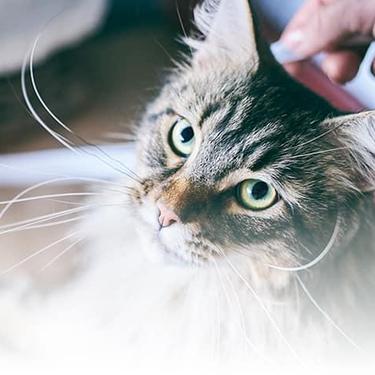
Learn how to make homemade cat treats that are healthy for your pet with this recipe from Hills Pet Nutrition.

Put your cat on a diet without them knowing
Our low calorie formula helps you control your cat's weight. It's packed with high-quality protein for building lean muscles, and made with purposeful ingredients for a flavourful, nutritious meal. Clinically proven antioxidants, Vitamin C+E, help promote a healthy immune system.
Put your cat on a diet without them knowing
Our low calorie formula helps you control your cat's weight. It's packed with high-quality protein for building lean muscles, and made with purposeful ingredients for a flavourful, nutritious meal. Clinically proven antioxidants, Vitamin C+E, help promote a healthy immune system.

